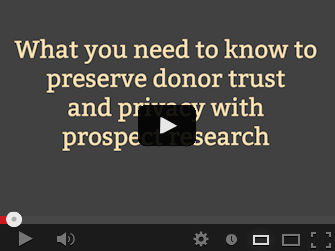 Whether it’s a personal story or a media headline, we’ve all heard of incidents where data was mishandled or misunderstood and donors felt betrayed. And yet, many development and advancement offices continue to place little value on their information and data.
Whether it’s a personal story or a media headline, we’ve all heard of incidents where data was mishandled or misunderstood and donors felt betrayed. And yet, many development and advancement offices continue to place little value on their information and data.When I followed up with one of the beta testers for the Prospect Research Institute’s first-ever online class, Introduction to Prospect Profiles, she told me how thankful she was for the opportunity to take the class. Now she knew for certain that prospect research was NOT for her and she would seek a different career. Why? She couldn’t delve into other people’s lives that much. Privacy was sacred to her.
I didn’t think too much of it, but since then two more students have expressed discomfort about privacy issues. Because, of course, we cover this in the class; we walk right out there to examine the legal and ethical edges of privacy in fundraising research.
Why are prospective prospect research professionals nervous about privacy?
Could it be they don’t trust organizations to do the right thing with information? You know fundraising is predicated on trust – donors trust us to use their money for the greater good. Staff must also trust the organization to use its data and resources appropriately.
When prospect research is treated as a clerical function, anyone can do it, low-paid, and not heard – that translates to the same message about the information prospect research finds. Quite a few of my course participants are self-paid. And then they learn how deep we researchers can go. And then they see the dark edges of ethics. And they get uncomfortable.
If you are in the development or fundraising office, you are in a position to begin changing the culture of respect and trust toward your organization’s data.
You can leverage prospect research to (a) manage information legally and ethically, (b) lead with diversity and inclusion, and (c) use data persuasively to raise more money. How? Let me count the ways!
- Data Management: Prospect Research Professionals are uniquely positioned to research and be a part of the team creating information management policies that ensure your data is used and maintained effectively. This is the era of Big Data and your researcher is versed in mining the gold from it.
- Data Protection:The more important data becomes, the higher the risk that it will be breached and erode your donors’ faith in your organization’s ability to protect their information. Your prospect research professional is your trusted guide, helping you to navigate and translate vendor and IT products and jargon. S/he is also the voice helping you to create different levels of data access, such as who can print profiles, with how much information in them, and do what with them.
- Non-Traditional Donors: We’ve been using wealth screenings effectively, but it’s time to recognize that this identification method is limited. Encourage your researcher to work with you to identify non-traditional indicators of wealth. That means conversations, but it also means assigning and actively pursuing those minority prospects, too. If there is wealth there, why are you ignoring them?
- Relationship Mapping: This is a broad term for what requires a great deal of sweat equity, but software is inching forward to make it better and faster. Understanding the relationships among your major gift donors could be a healthy disruption to your usual processes. Understanding and learning to leverage the power of your other donor groups’ relationships could transform your organization’s fundraising reach! If you are not building the capacity for fundraising analytics to discover patterns such as these relationships, you will be left behind.
- Persuade with Data: Yes, you can work with your prospect research professional to illustrate the data that answers questions and use this to persuade donors to give. Infographics are particularly popular. But let’s use data to put a stop to fickle fundraising. How many times do you change strategies based on “I feel” or “s/he said” or “they say”? Use your prospect research professional’s analytical prowess to methodically gather data of all kinds to help leadership form a strategy it can stick to – and win. Jason Briggs outlines this brilliantly in his article on international research.
I’ve had clients learn the hard way. Initially shocked by my prices, they come back when they receive shoddy work from someone who has low rates, but lacks the skills and resources. The value of really good prospect research becomes clear when you receive synthesized information that gives you direction to raise more money.
Your organization needs a well-trained prospect research professional with an excellent ethical compass. Are you driving your best hiring prospects away by sending the message that information is cheap and anyone can turn that information into fundraising action?
More Resources You Might Like
Privacy and Prospect Research Video
- APRA Ethics and Professional Standards
- Can you really trust prospect research? 10 things you should know | Jen Filla
- Fundraising + Science = ? | Jen Filla
